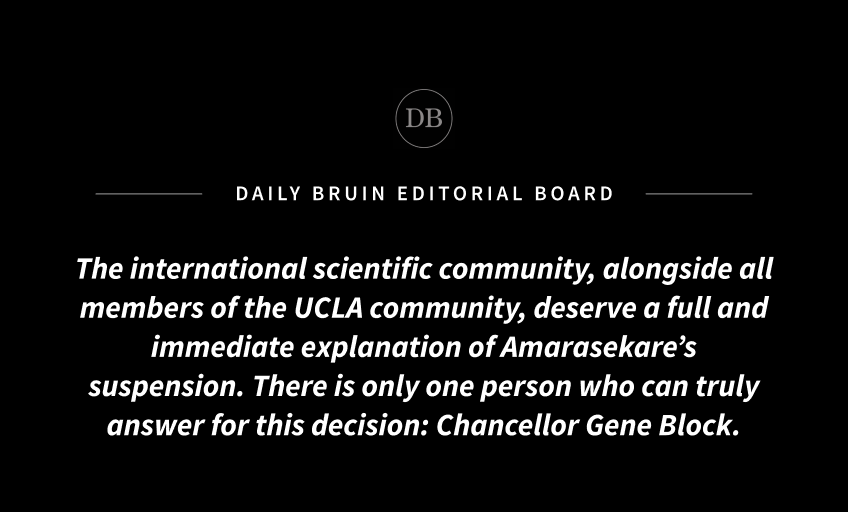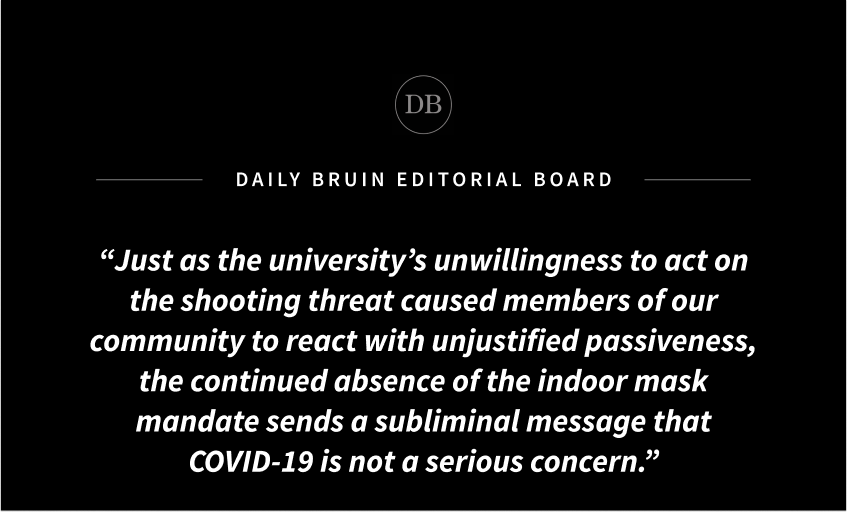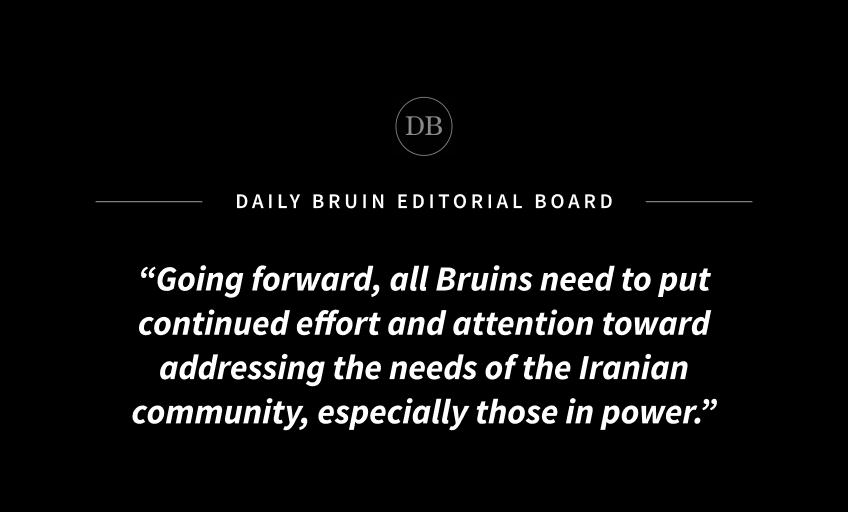Editorial: UCLA community deserves explanation for Professor Amarasekare’s suspension

By Editorial Board
March 5, 2023 8:46 p.m.
Editor’s note: Editorials do not represent the views of the Daily Bruin as a whole. The board encourages readers to respond to our editorials at dailybruin.com/submit.
UCLA’s consistent refusal to explain the suspension of one of the most eminent ecologists of our time is yet another example of its lack of accountability.
UCLA Professor Priyanga Amarasekare is a Guggenheim fellow and recipient of the Ecological Society of America’s Robert H. MacArthur Award.
In July, however, she was suspended without pay on a nebulous set of charges and banned from furthering her scientific research, which focused principally on understanding the ecological effects of climate change. New internal emails and documents confirm that these harsh penalties came from the very top of the UCLA administration.
Amarasekare, who is of Sri Lankan descent, is one of the only two women of color who have tenure in UCLA’s Department of Ecology and Evolutionary Biology. Under the terms of her one-year suspension, she was stripped of the ability to take care of her insect colony, access her lab, manage her grants and contact her students.
Hundreds of scientists, many in ecology departments around the globe, have signed a petition to the UC Regents and UCLA’s chancellor to reinstate Amarasekare.
This isn’t the first time Amarasekare has clashed with the university. She developed a reputation for addressing tough topics and challenging department policies.
Amarasekare has previously accused the institution of discrimination after being denied promotions that were granted to colleagues. In 2014, an independent review concluded that the department’s rejection of a promotion Amarasekare sought in 2013 was a product of prejudicial bias.
Faculty members and previous students speculate that the professor’s suspension may have been in retaliation for her vocal criticism of her department.
The international scientific community, alongside all members of the UCLA community, deserves a full and immediate explanation of Amarasekare’s suspension.
There is only one person who can truly answer for this decision: Chancellor Gene Block.
According to internal emails and documents reported by both Nature and the Chronicle of Higher Education, Amarasekare was found by the Academic Senate Committee on Privilege and Tenure to have violated two sections of the Faculty Code of Conduct.
Following the murder of George Floyd, the department established an email list specifically to discuss equity, diversity and inclusion issues on campus. In August 2020, Amarasekare sent an email condemning the department for its stance toward racism, alleging she was denied opportunities for professional advancement. She further criticized the department’s decision to appoint white faculty members and “token” minorities to the department’s Anti-Racism Task Force.
In particular, Amarasekare allegedly violated confidentiality procedures about staffing decisions and judging the professional merit of other faculty members based on factors unrelated to professional performance.
However, the committee recommended that the ecologist be given a letter of censure and placed on probation for five years for these infractions, with pay cuts only if the terms of the probation were broken.
Instead, the penalties that the Chancellor’s Office issued for these offenses were much harsher than those recommended by the committee.
Under the UC system’s policy of “shared governance,” the chancellor is given ultimate discretion over disciplining faculty accused of misconduct. According to Section 16 of the UC Academic Personnel Manual, the UC campuses’ chancellors have the exclusive power to suspend faculty members or reduce their salaries – an authority which cannot be delegated under any circumstances.
The manual further outlines the chancellor’s ability to end sanctions against a faculty member at their own discretion.
The fact that Block dismissed the committee’s recommendation is odd, particularly in light of how severe the sanctions against Amarasekare were. The scientists’ petition to the university to reverse Amarasekare’s suspension noted the punishments she received were mostly unheard of outside of cases of academic or sexual misconduct.
In this case, the sanctions have clearly had severe and devastating impacts. A GoFundMe set up to provide support for Amarasekare states that without income and health insurance, she is facing an imminent foreclosure on her house and is having difficulties supporting her two children.
The disparity between the committee recommendation and the chancellor’s decision cannot go unexplained.
In cases of disagreement between the committee recommendation and the chancellor, there is no mechanism to prevent the chancellor from imposing their decision. However, the chancellor must inform the committee chair in writing and allow the chair and the committee to meet and discuss before the final decision is issued.
In letters published in Nature and the Chronicle of Higher Education, neurobiologist and UCLA Vice Chancellor for Academic Personnel Michael S. Levine responded to the reporting of both outlets before the release of the new documents and alleged that the articles included “statements that we find to be unsubstantiated, although they are presented as fact.”
The letters did not refute any specific details, which would have allegedly violated the university’s privacy policy.
“These statements are causing irreparable harm to individuals who are not able to respond publicly because they are observing university policy on privacy and confidentiality, creating an imbalance in the public discourse,” Levine wrote in the statement to Nature.
However, with the release of the new documents leaked to the press by unknown parties, confidentiality is out of the question.
In this case, the public has seen internal university processes that have previously been dominated by secrecy and obscurity. The onus is now on UCLA to address the disclosures and why Amarasekare was punished as severely as she was.
Absent extraordinary circumstances, the way in which Amarasekare, an accomplished scientist and single mother, has been treated by the university seems widely disproportionate and even cruel when compared to the alleged offenses.
UCLA hasn’t lived up to its standards of inclusivity. The community deserves answers now.




